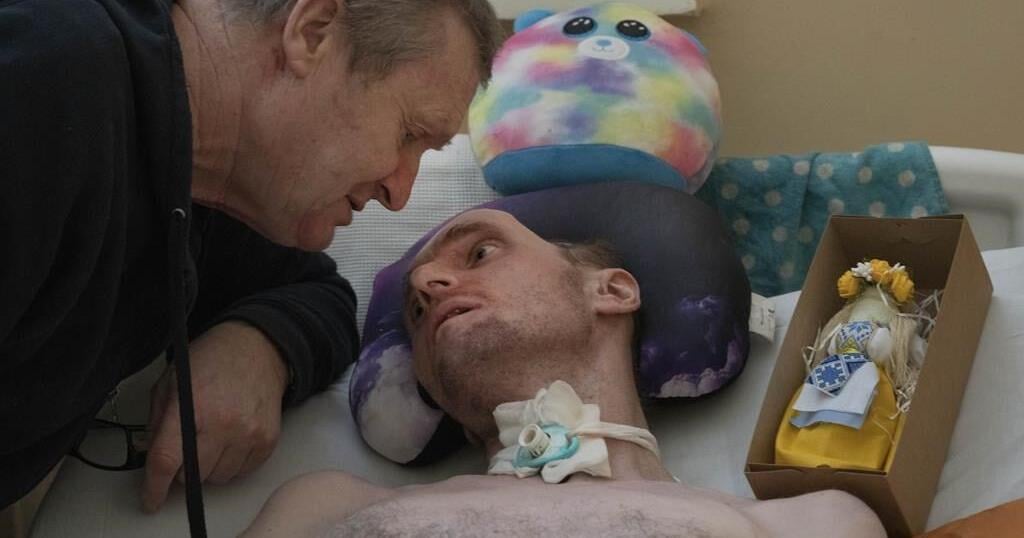MODRYCHI, Ukraine (AP) — For two years, a devoted father has stayed by the side of his bedridden son, a Ukrainian soldier who suffered a severe brain injury. Passing through hospitals and rehabilitation centers, the father finds joy in every small victory of his 36-year-old son: a smile, a new word, an unexpected movement.
These milestones mark progress that the doctors doubted would ever come.
The Associated Press reported on Vitalii Shumei’s story one and a half years ago, and it went viral. It brought attention of many across the world, including Ukrainian soccer club Shakhtar Donetsk, which offered to pay for the expensive treatment that Shumei badly needed.
Shumei, an anti-aircraft missile commander, was wounded in August 2022 while fighting in the Donetsk region — a front line that remains the hottest part of the 1,000-kilomter-long (more than 600-mile) front line in Ukraine. Shumei defended Avdiivka, a city that has since fallen to Russian forces, and the longest battle of the war for Bakhmut had just begun at the time of his injury.
Now, Russian troops are advancing toward another major city, Pokrovsk, where the battle is likely to be as grinding and brutal as those for other cities in the Donetsk region.
But ultimately the price for the slow advance of Russian forces in the Donetsk region pay the soldiers and their families in the war, where dozens of thousands have been killed and wounded.
“We’ve already started to make some progress, if only his legs would start working,” said Serhii Shumei, his 65-year-old father. “Soon we’ll be walking and we’ll go to the gym every day.”
In their room at the rehabilitation centre in Modrychi of Western Ukraine there are two beds. Vitalii Shumei sleeps by the window, and his father rests opposite him.
Serhii’s life now revolves around his son’s future.
An orange Shakhtar soccer jersey with the name Shumei and No. 35 in black print adorns the wall. Nearby, a blue-and-yellow Ukrainian flag signed by Shakhtar players is displayed beside a photograph of a smiling Vitalii from before his injury.
Serhii had been a dedicated Shakhtar fan his entire life, so when they offered to cover his son’s treatment one and half years ago, he could hardly believe it.
Back then, Vitalii’s condition was grave after the shell struck his dugout. The blast tore a crater in his skull that was as deep and broad as half a melon. He could blink, swallow but was largely immobile.
They went for treatment in Barcelona, Spain. Following extensive examinations, Vitalii underwent brain surgery and received plates to reconstruct his skull.
“The surgery was very complex, but he’s strong. I knew he would endure,” his father said.
A few months later, Serhii and his son returned to Ukraine, because Vitalii felt very anxious hearing a foreign and unfamiliar language.
He immediately felt relief, and by February of this year, Vitalii began to laugh and started speaking.
“I was immensely pleased. Though it was a small victory, it was still ours,” he says. “I walked with my head held high, proud of how far we’ve come.”
Initially, Vitalii used simple “yes” or “no” responses, but his vocabulary gradually expanded to include colors, days of the week and names of close relatives.
His father accompanies him to every rehabilitation session.
During one of the sessions, ergotherapist Svitlana Kononeko, who helps Vitalii improve his daily functioning through rehabilitation, constantly engages with him. He sits in a chair facing a large mirror while she uses questions to help him recognize his reflection.
“Vitalii, there’s a mirror in front of you. Can you see yourself?”
There is silence in response. She asks again, “Do you need a moment to rest?” He responds with a quiet “Yes.”
Kononeko has been working with Vitalii for several months and notes significant progress recently. Besides Vitalii, she also has several other patients, most of whom are soldiers like him.
“What’s your call sign?” Kononeko asks. Shumei barely whispers, “Leon.”
“It’s been such a long and difficult journey,” says volunteer Iryna Tymofeyeva, who met the family about a year and a half ago and continues to support Serhii, who also needs an ally on this challenging path. She said that only the two of them “were crazy enough” to believe from the start that Vitalii could make such progress one day.
When Vitalii’s tracheostomy was removed a month and a half ago, his father finally was able to get some real sleep for the first time in nearly two years of nonstop caregiving. Now, he occasionally takes short walks around the rehabilitation center, which is nestled in picturesque greenery.
However, he never leaves Vitalii for long and stays close by at all times.
“I’ll leave him only when I see that he’s on his feet,” says his father. “Then he can start living his own life.”
The next, eagerly anticipated stage of rehabilitation will be when Vitalii can stand and begin walking. Rehabilitation specialists are reluctant to predict when this might happen, as the outcome depends on many factors that are difficult to forecast. One thing remains constant, though — the support of his father.
“This is my child, and I have to hold on and do everything I can to help him get better,” he said. “If anyone feels like giving up, with soldiers or civilians, don’t give up, hold on by a thread.”
___
Efrem Lukatsky contributed to this report.
___
